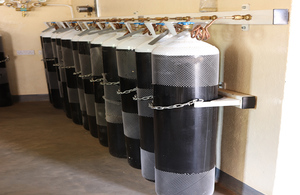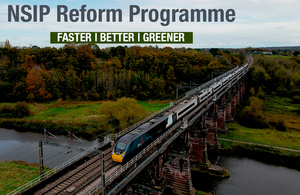Plans for a new pilot to help people exercise more and eat better are being laid out today (Wednesday 7 July), as the government looks for a partner to help run the scheme.
As part of our world-leading healthy weight strategy, the new scheme will explore the best ways to incentivise adults to make healthier choices.
Obesity related illnesses cost the NHS £6 billion a year and the scale of the challenge has been highlighted by COVID-19 disproportionately affecting people who are overweight. With almost two-thirds of adults in England living with excess weight or obesity the programme will focus on incentives and rewards for healthy behaviours, including increasing physical activity and eating better to support people to live healthier lives.
The successful supplier will partner with a range of organisations who can provide incentives which may include vouchers, merchandise, discounts, and gift cards to reward people for making healthy choices.
The six-month pilot is expected to launch in January 2022, and today the government has announced an open tender for the Health Incentives programme.
Public Health Minister, Jo Churchill, said:
This government is committed to improving the health of everyone and we want to make it easier for people to increase their physical activity and eat better.
The Health Incentives scheme will help us understand the role that rewards and incentives could play, in helping people lead healthy lives. This aims to help level up the health of our nation. This scheme further demonstrates the dedication in our strategy to encourage people to lead healthier, happier lives.
There are promising international examples of health incentives programmes, such as Singapore’s National Steps Challenge, and the government is looking to understand the value of these programmes to inform what can be achieved in England.
Sir Keith Mills, who has pioneered reward programmes through Airmiles and Nectar points, is advising the Health Incentives programme and will support the government in leveraging the very best innovation in the public and private sector to test the role that rewards and incentives can play in encouraging healthier behaviours.
Sir Keith Mills, advisor on the Health Incentives Scheme, said:
The Health Incentives scheme could be a vital tool in the government’s plans to tackle health inequalities and encourage healthier behaviours.
This is a fantastic opportunity for businesses, the public and third sectors to come together and deliver a new and exciting way of supporting people to healthier habits. This is why we are calling for interested partners to come forward with their innovative ideas and help play a pivotal part in the government’s plans to improve public health.
The government is now in the process of finding delivery partners and is inviting interested parties to come forward. The tender has been launched on the government’s Find a Tender service and Contracts Finder for a delivery partner to design and run the Health Incentives scheme with the Department of Health and Social Care.
The Health Incentives scheme was announced as part of a £100 million package of government support to help those living with obesity to move closer towards a healthier weight and give them the tools they need to maintain this. Evidence suggests that financial incentives can improve rates of physical activity and inspire healthier eating.
The Office for Health Promotion – launching fully later this year – will lead national efforts to level up the health of the nation by continuing to support people living with obesity, supporting mental health and promoting physical activity.
Organisations interested in working with the Department of Health and Social Care on the Health Incentives Programme should get in touch via: healthincentives@dhsc.gov.uk

